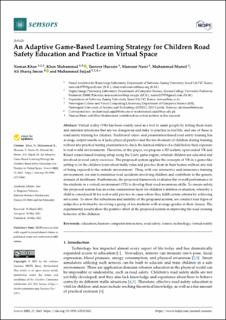| dc.description.abstract | Virtual reality (VR) has been widely used as a tool to assist people by letting them learn and simulate situations that are too dangerous and risky to practice in real life, and one of these is road safety training for children. Traditional video- and presentation-based road safety training has average output results as it lacks physical practice and the involvement of children during training, without any practical testing examination to check the learned abilities of a child before their exposure to real-world environments. Therefore, in this paper, we propose a 3D realistic open-ended VR and Kinect sensor-based training setup using the Unity game engine, wherein children are educated and involved in road safety exercises. The proposed system applies the concepts of VR in a game-like setting to let the children learn about traffic rules and practice them in their homes without any risk of being exposed to the outside environment. Thus, with our interactive and immersive training environment, we aim to minimize road accidents involving children and contribute to the generic domain of healthcare. Furthermore, the proposed framework evaluates the overall performance of the students in a virtual environment (VE) to develop their road-awareness skills. To ensure safety, the proposed system has an extra examination layer for children’s abilities evaluation, whereby a child is considered fit for real-world practice in cases where they fulfil certain criteria by achieving set scores. To show the robustness and stability of the proposed system, we conduct four types of subjective activities by involving a group of ten students with average grades in their classes. The experimental results show the positive effect of the proposed system in improving the road crossing behavior of the children. | en_US |

